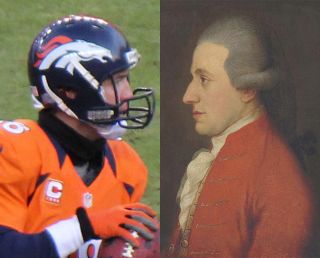Sport and Competition
Manufacturing Mozarts and Mannings
Child prodigies in music and sports make for fascinating case studies.
Posted November 4, 2013

I enjoy finding parallels between music and sports. While these two domains are sometimes thought of as very different, research attests to some interesting commonalities (e.g., Martin, 2008; Nordin-Bates, 2012). There are important principles and processes that are illustrated well in both music and sports—principles and processes that are not just fundamental in the lives of performers, but in the lives of all people. These include teamwork, creativity, emotion and motivation, and anxiety, just to name a few. I’m so interested in these things that I created a course that I now teach at the University of Nebraska–Lincoln called “Music and Sports: Performance and Perception.” The topics listed above relate mostly to the performance part of the class. For the coverage of perception, we largely consider society’s adoration of musical or sporting events and players. Whether it’s an athlete on the field/court or a musician onstage, fans love to be drawn into the emotion of the scene before them and be dazzled by greatness.
Amazing child performers are particularly fascinating in music and sports. I recently watched the ESPN Films documentary “The Book of Manning,” which offered behind-the-scenes access to the development of two professional football quarterbacks, brothers Peyton and Eli Manning, whose father Archie was also a pro QB (see the trailer here). At one point in the film, the narrator calls Peyton a prodigy. The use of this term was just one parallel between the Manning boys’ development and that of exceptional young musical performers. In fact many of the characteristics of the Mannings' childhood—including those presented in the film as most contributing to their success as adults—are often found in the biographies of professional musicians. Actually, as I heard Peyton and Eli talk about their father as their chief mentor and teacher, it reminded me a lot of how fellow New Orleans natives Branford and Wynton Marsalis speak of their father Ellis.
In my Music and Sports class, I have used a couple of YouTube videos that present two wonderful child prodigies. The videos are local news reports about kids in their communities. One is a budding pianist and composer, and the other a young basketball phenom. What I like about these videos is that they don’t just show the children performing, but they give insight into their backgrounds: their families, personalities, and home environments. Despite the news reporters presenting these children as unexplainable wonders of genetics or giftedness (and I get it…it makes for a better story), we can see how these kids have personal passion for what they do, and have had special opportunities to acquire their impressive skills.
The video of 6-year-old musician Emily Bear (she’s now 12) does much to advance the idea of giftedness. The title of the feature suggests that she is “the next Mozart” and the reporter begins by stating that she was “born to play the piano.” From those around her, she has come to believe that music simply comes from within her. Yet the report also points out that Emily grew up in a home filled with music, including a brother who plays classical guitar and sister who’s a pianist and harpist. The short video also reveals that one of her grandmothers is a “concert pianist who’s made a career of teaching musically gifted children,” and that Emily's other teachers have included a piano faculty member at the Music Institute of Chicago and the principal keyboardist of the Chicago Symphony (she also has since been mentored by legendary music producer Quincy Jones). Personally, instead of attributing her superb musicianship to a giftedness she had no control over, I marvel at how well Emily has made the most of her opportunities, and how her own musical drives and joy have resulted in her becoming an accomplished concert pianist, jazz artist, and composer.
My sports parallel is young basketball player Jordan McCabe. Labeled a prodigy and a phenom, this kid can do some pretty spectacular things with a basketball (actually with two sometimes!). He has skills that very few other people on the planet can even approach, which would leave many to believe he’s been endowed with some kind of special athleticism. Yet this video report makes mention of the hours of practice that Jordan has put in, including with his father and grandfather; the reporter calls him “the classic gym rat.” His father recounts how Jordan got “hungrier for doing more and more” as his skills grew. In addition to this personal motivation to achieve, I’m struck by the enjoyment and reward this young man clearly gets from playing basketball.
These two videos, like the Manning documentary, illustrate a number of principles offered by the research on the acquisition of expert performance skills (e.g., Creech & Hallam, 2011; McPherson, Davidson & Faulkner, 2012). Before becoming a virtuoso musician or athlete, young people have significant exposure in the domain, and access to resources to quickly grow in it (e.g., mentors and teachers, time and places to practice). But more than this, they have an internal drive to grow and succeed in the domain. They are not manufactured by anyone else to become performers; they want to do it themselves.
There are several key contributors to this kind of motivation. First, the children manage to keep the fun in their activities, no matter how much structured practice or competition they are part of. They maintain a large sense of autonomy, being able to exercise choice in what they do and have opportunities to explore and be creative. Their parents contribute to this by simply being parents. That is, they don't necessarily aspire to be their children's primary teacher or mentor (even if they could be), or career manager. The “Book of Manning” documentary shares that father Archie did not let his boys play organized little league football too early. So the informal and social setting of backyard games was where they got their football fix as youngsters. Archie didn’t force football on his kids, rather he insisted that they made their own decisions and followed their own passions. He was happy to share his football expertise with his sons, but they had to come to him for it. As Peyton says in the film, "He was going to be a parent first, and kind of an ex-football player after that."
I believe much can be gained from considering childhood biographical accounts of successful performers. That said, I recognize that these stories don’t offer much to settle the nature versus nurture debate. Musical parents tend to provide their children with musical environments from the earliest stages of life. But we need not know the exact value of nature to realize that nurture is the only part of the equation that we have any control over. Parents and teachers would do well to support their young musician's personal interests, sense of autonomy, and enjoyment in the domain.
References
Creech, A., & Hallam, S. (2011). Learning a musical instrument: The influence of interpersonal interaction on outcomes for school-aged pupils. Psychology of Music, 39(1), 102-122.
Martin, A. J. (2008). Motivation and engagement in music and sport: Testing a multidimensional framework in diverse performance settings. Journal of Personality, 76(1), 135-170.
McPherson, G. E., Davidson, J. W., & Faulkner, R. (2012). Music in our lives: Rethinking musical ability, development, and identity. New York: Oxford University Press.
Nordin-Bates, S. M. (2012). Performance psychology in the performing arts. In S. M. Murphy (Ed.), The Oxford handbook of sport and performance psychology (pp. 81-114). New York: Oxford University Press.
Copyright 2013 Robert H. Woody
Source of images: wcfsymphony and Jeffrey Beall on Flickr Creative Commons




